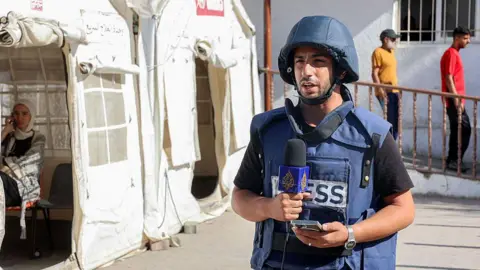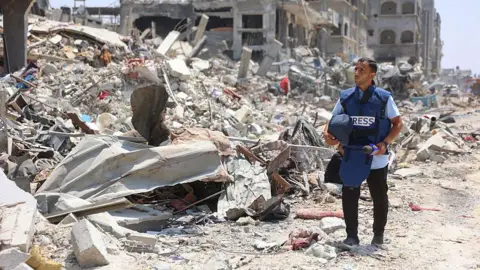Who was the Al Jazeera journalist killed by Israel in Gaza?

 AFP via Getty Images
AFP via Getty ImagesFive Al Jazeera journalists were killed by an Israeli strike in Gaza City on Sunday – among them 28-year-old correspondent Anas al-Sharif, who had reported prominently on the war since its outset.
The other four Al Jazeera journalists killed were correspondent Mohammed Qreiqeh, and cameramen Ibrahim Zaher, Mohammed Noufal and Moamen Aliwa, Al Jazeera said.
Two others were also killed, the broadcaster said. Hospital officials named Mohammed al-Khaldi, a local freelance journalist, as one of them.
The targeted attack on a tent used by journalists has drawn strong international condemnation including from the UN, Qatar where Al Jazeera is based, and media freedom groups.
Israel says Sharif was “the head of a Hamas terrorist cell” but has produced little evidence to support that. Sharif previously denied it, and Al Jazeera and media rights groups have rejected the allegation.
The BBC understands Sharif worked for a Hamas media team in Gaza before the current conflict.
In some of his social media posts before his death, the journalist can be heard criticising Hamas.
Committee for the Protection of Journalists CEO Jodie Ginsberg told the BBC there was no justification for Sharif’s killing.
“International law is very clear on this point that the only individuals who are legitimate targets during a war are active combatants. Having worked as a media advisor for Hamas, or indeed for Hamas currently, does not make you an active combatant”, she said.
“And nothing that the Israeli forces has produced so far in terms of evidence gives us any kind of assurance that he was even an active member of Hamas.”
The ‘only voice’ left in Gaza City
 AFP via Getty Images
AFP via Getty ImagesAnas al-Sharif became one of Al Jazeera’s most prominent reporters in Gaza during the war.
Born in the densely populated Jabalia area in the north of the Strip, he worked for Al Jazeera for about two years, the broadcaster said.
“He worked for the whole length of the war inside Gaza reporting daily on the situation of people and the attacks which are committed in Gaza,” Salah Negm, director of news at Al Jazeera English, told the BBC.
Married with a four-year-old daughter, Sham, and a one-year-old son, Salah, he was separated from them for long stretches during the war while he continued to report from the north of the territory after refusing to follow Israeli evacuation orders.
A joint Instagram post on his official account along with his wife’s in January this year showed a picture of Sharif smiling with his two children. The caption said it was the first time he was meeting Salah, after 15 months of war.
Allow Instagram content?
Sharif appeared frequently in live broadcasts, reporting extensively on the situation in Gaza.
He reported on the targeting of his colleagues, including prominent Al Jazeera correspondent Ismail al-Ghoul and cameraman Rami al-Rifi, who were killed in 2024 in an air strike in Gaza City.
His father had already been killed in December 2023 when the family home was targeted in an Israeli strike. Hours before he himself was killed, he posted about an intense Israeli bombardment of Gaza City.
Mohamed Moawad, Al Jazeera’s managing editor, described him as the “only voice left in Gaza City” – which Israel now plans to militarily occupy.
Raed Fakih, input manager at Al Jazeera’s Arabic-language channel, told the BBC Sharif was “courageous, dedicated, and honest – that’s what made him successful as a journalist with hundreds of thousands of social media followers from all over the world”.
Fakih, who is in charge of the channel’s bureaux and correspondents, added: “His dedication took him to areas where no other reporter ventured to go, especially those that witnessed the worst massacres. His integrity kept him true to his message as a journalist.”
Fakih said he spoke to Sharif many times on the phone throughout the war.
“In our last conversations, he told me about the famine and starvation he was enduring, about how hard it is to survive with so little food,” he said.
“He felt he had no choice but to amplify the voice of the Gazans. He was living the same hardships they are living now, suffering from famine, mourning loved ones.
“His father was killed in an Israeli bombing. In that way, he was like all Gazans: carrying loss, pain, and resilience. And even in the face of death, he persisted, because this is a story that must be told.”
Mohammed Qreieh, 33, was a father of two from Gaza City, the Associated Press news agency reported. Like Sharif, he was separated from his family for months during the war as he reported from the front lines in northern Gaza, AP added.
Qreieh’s last live broadcast was on Sunday evening, minutes before he was targeted, Al Jazeera Arabic reported.
Israel alleges Sharif led ‘terrorist cell’, with little evidence
The Israeli military accused Sharif of posing as a journalist, saying he had “served as the head of a terrorist cell in Hamas” and was responsible for launching rocket attacks at Israelis – but it has produced little evidence to support these claims.
In a statement, the IDF said it had documents which “unequivocally prove” his “military affiliation” with Hamas, including “personnel rosters, lists of terrorist training courses, phone directories, and salary documents”.
It has publicly released some screenshots of spreadsheets apparently listing Hamas operatives from the northern Gaza Strip, noting injuries to Hamas operatives and a section of what is said to be a phone directory for the armed group’s East Jabalia battalion.
Israel had previously accused Sharif of being a member of Hamas’s military wing – something he and his employer strongly denied.
Reporters Without Borders (RSF), a media freedom group, said the allegations against him were “baseless” and called on the international community to intervene.
“Without strong action from the international community to stop the Israeli army… we’re likely to witness more such extrajudicial murders of media professionals,” RSF said.
Nearly 200 journalists have been killed in the war Israel launched in response to Hamas’s October 7, 2023 assault, according to RSF.
Fakih from Al Jazeera accused the Israeli military of fabricating stories about journalists before killing them, to “hide what [it] is committing in Gaza”. Israel has previously denied targeting journalists.
He described this as a “longstanding pattern” and referred to the Israeli military’s killing of veteran Palestinian-American journalist Shireen Abu Aqla, who was shot in the head during an Israeli army raid in the occupied West Bank in 2022.
The Israeli military concluded that one of its soldiers probably killed her, but called her death unintentional. Al Jazeera said its evidence showed it was a “deliberate killing”.
“Here is a crucial fact: had Israel been held accountable for Shireen’s assassination, it would not have dared to kill 200 journalists in Gaza,” said Fakih.
Sharif knew he risked being targeted by Israel after its Arabic-language spokesman posted a video of him in July and accused him of being a member of Hamas’ military wing.
In a post published on his X account, which was prewritten in the event of his death, Sharif said he “gave every effort and all my strength to be a support and a voice for my people… Do not forget Gaza.”
Source link


